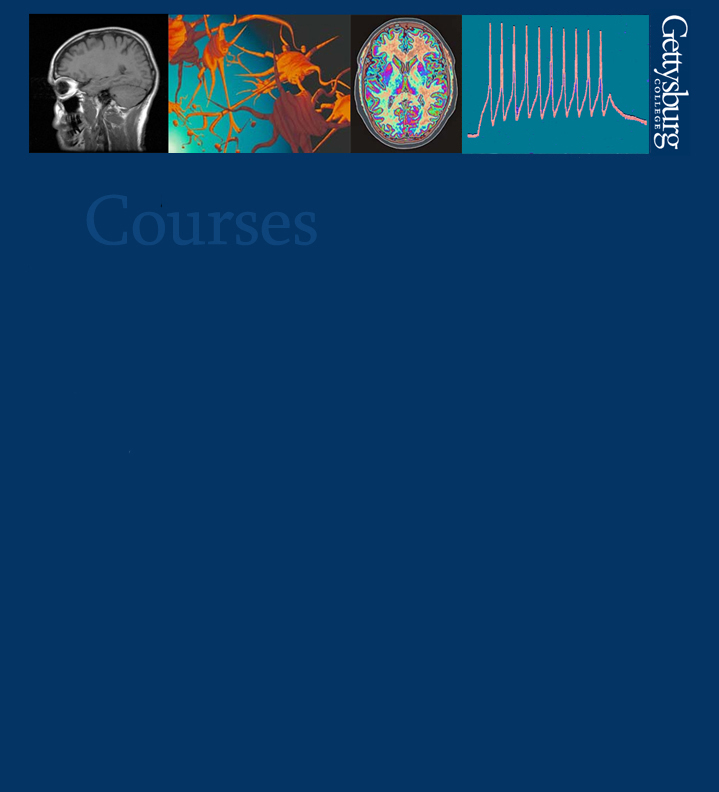


|
I currently teach Cell Biology (BIO 212) in the Fall semester and Neurobiology (BIO 235) in the spring semester. I am also excited to supervise students in independent study projects, including both reading-based tutorial type independent studies (BIO 452 or 453) and hands-on lab research projects (i.e., BIO 460), in areas related to Neurobiology, Cell Biology, or Behavior. Any students interested in minoring in Neuroscience should also check out the Neuroscience website, HERE. Neurobiology (BIO 235): Neurobiology explores the biological basis of brain function:
In lecture and in lab, we will focus on the experimental techniques used by modern neurobiologists to explore brain structure and function. We will accomplish this goal in part by reading and discussing a number of papers from the scientific literature throughout the semester delving into one focused question in Neurobiology – in 2007, we explored how a particular brain structure, the hippocampus, forms memories, apparently through specific changes in the chemical connections between nerve cells. In the lab component of the course, we will take a hands-on approach to study the electrical and chemical properties of nerve cells in living animals (crayfish and snails). BIO 235 is an elective for students majoring in Biology (fulfilling the cellular / molecular requirement) and for those majoring in Biochemistry and Molecular Biology. BIO 235 is also a required core course for all students minoring in Neuroscience. For a detailed syllabus, see HERE. Cell Biology (BIO 212): The standard definition of a cell in most introductory biology texts includes the line that cells are “the fundamental building blocks of all organisms.” Because of this fact, trite though it may be, a detailed understanding of the fundamental processes of cellular function is critical to all specialties within biology, clinical or academic. Some of these processes, including for example the biochemical mechanisms underlying cellular energetics, are remarkably consistent from bacteria to human. Other cellular processes and structures vary from cell type to cell type or organism to organism, allowing for unique adaptations of cells and organisms to particular functions. For example, nerve cells (my favorites!) have various properties allowing them to conduct electrical signals and therefore process information, while kidney cells are specialized for the secretion of waste, and red blood cells for the transport of oxygen and carbon dioxide. What are the differences in physiology from cell type to cell type determining these specific functions? This course is a required course for all students majoring in Biology or in Biochemistry and Molecular Biology, and is also required for students who wish to obtain a B.S. degree in Health and Exercise Sciences. BIO212 is also offered in the Spring Semester. A detailed syllabus is available HERE. Independent Study – Research (BIO 460, etc.): As a neurobiologist, I study how the anatomy and physiology of nerve cells and circuits of interconnected nerve cells shape the myriad fascinating behaviors and perceptual abilities of animals and humans. Specifically, my own research focuses on the brain circuits involved in vocal communication behaviors in fish and birds (mainly the former). Students interested in working in my lab could be involved in a variety of projects using different techniques to study the anatomy, the neurochemistry, and/or the electrophysiology of these circuits in the context of how fish and birds produce their courtship and territorial songs. Students should expect to spend at least 2 semesters on their project (with one of these probably occurring over the summer), and should therefore begin planning for this project no later than spring semester of their junior year, ideally sooner. For more details, see my Research page. Independent Study – Tutorial (BIO 452, 453, etc.): Any students wishing to dive into an in-depth exploration of the scientific literature relating to any specialized area of Neurobiology, Behavior, or Cell Biology, are welcome to approach me about doing an independent tutorial. We would choose, read, and discuss papers each week related to a focused topic in any one of these areas. These can be pretty free-wheeling, with much of the direction dependent on how your interests evolve over the course of the semester. These tutorials can be either taken for a grade or pass-fail, and would typically involve writing one or more essay papers summarizing or reviewing the current state of knowledge in the area of focus.
|